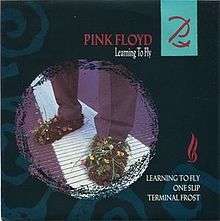Learning to Fly (Pink Floyd song)
"Learning to Fly" is a song by the English progressive rock band Pink Floyd, written by David Gilmour, Anthony Moore, Bob Ezrin, and Jon Carin. It was the first single from the band's thirteenth studio album A Momentary Lapse of Reason.[1][2] It reached number 70 on the U.S. Billboard Hot 100 chart and number 1 on the Billboard Album Rock Tracks chart in September, 1987, remaining three consecutive weeks at the top position in the autumn of the same year. Meanwhile, the song failed to chart on the official U.K. top 40 singles charts.[3][4] On the other hand, in Spain, the song peaked at number 1 on the Los 40 Principales chart.[5]
| "Learning to Fly" | ||||
|---|---|---|---|---|
 Artwork for EMI release; the Columbia release uses the same artwork but replaces cyan with black for the "PF" logo. Various non-UK releases either omit other titles or contain one other title on the front cover | ||||
| Single by Pink Floyd | ||||
| from the album A Momentary Lapse of Reason | ||||
| B-side | "Terminal Frost" | |||
| Released | 14 September 1987 | |||
| Recorded | November – December 1986 | |||
| Genre | Progressive rock | |||
| Length | 4:53 (album version) 4:21 (single edit) | |||
| Label | ||||
| Songwriter(s) | ||||
| Producer(s) |
| |||
| Pink Floyd singles chronology | ||||
| ||||
Background
The song was primarily written by David Gilmour, who developed the music from a 1986 demo by Jon Carin. The notable rhythm pattern at the beginning of the song was already present in the demo, and Carin stated that it was influenced by Steve Jansen or Yukihiro Takahashi.[6]
The lyrics describe Gilmour's thoughts on flying, for which he has a passion (being a licensed pilot with multiple ratings), though it has also been interpreted as a metaphor for beginning something new, experiencing a radical change in life, or, more specifically, Gilmour's feelings about striking out as the new leader of Pink Floyd after the departure of Roger Waters. Gilmour confirmed the latter interpretation on the Pink Floyd 25th Anniversary Special in May 1992. Also an avid pilot, drummer Nick Mason's voice can be heard at around the middle of the song. "Learning to Fly" was included on Pink Floyd's greatest hits collection Echoes: The Best of Pink Floyd.[7]
The track was regularly performed live on the band's two post-Roger Waters tours, with touring guitarist Tim Renwick playing the song's guitar solos (although David Gilmour played the solos on the studio version of the track). A live version is included on Delicate Sound of Thunder and Pulse. At the end of the final solo in both versions, a guitar lick from the second verse of "Young Lust" ("Oooh, baby set me free") is played.
Music video
The music video was directed by Storm Thorgerson, a longtime collaborator of Pink Floyd who had designed many of their album covers, and filmed on West Wind Ridge, a mountain in Kananaskis Country near Canmore, located some 50 to 75 km west of the city of Calgary, Alberta[8] during rehearsals for the band's A Momentary Lapse of Reason Tour. The video combined performances of the band with a Native American, played by Canadian actor Lawrence Bayne, working in a field who then runs and jumps off a cliff to turn into a red-tailed hawk. The footage of the stage show shows the band performing "Learning to Fly" but features the more colourful light-show used for live performances of "One of These Days". The red/orange airplane is a Beech Model 17 Staggerwing.
The original video also depicts a factory worker who turns into an aeroplane pilot as well as a child who breaks free from his mother and dives off a cliff into a deep river, swimming away.
The video went to #9 on MTV's Video Countdown in November 1987 and was the #60 video of MTV's Top 100 Videos of 1987. The video won the band its only MTV Video Music Award for "Best Concept Video" in 1988.
Personnel
- Pink Floyd
- David Gilmour – lead vocals, guitars, sequencer
- Nick Mason – drums, spoken words, sound effects
Additional musicians:
- Jon Carin – keyboards
- Richard Wright – keyboards, backing vocals
- Bob Ezrin – sequencer, percussion
- Tony Levin – bass guitar
- Steve Forman – percussion
- Darlene Koldenhaven – backing vocals
- Carmen Twillie – backing vocals
- Phyllis St. James – backing vocals
- Donnie Gerrard – backing vocals
See also
- List of number-one mainstream rock hits (United States)
References
- Strong, Martin C. (2004). The Great Rock Discography (7th ed.). Edinburgh: Canongate Books. p. 1177. ISBN 1-84195-551-5.
- Mabbett, Andy (1995). The Complete Guide to the Music of Pink Floyd. London: Omnibus Press. ISBN 0-7119-4301-X.
- "Allmusic: Pink Floyd (Awards) Billboard singles". Allmusic. Retrieved 2013-09-27.
- "Pink Floyd singles". officialcharts.com. Retrieved 2013-09-27.
- "Números 1 del año 1987 - Los 40 Principales" (in Spanish). Retrieved 5 Aug 2018.
- "Jon Carin interview - August 2007 - with Brain Damage". Brain Damage. 2007-08-17. Retrieved 2014-08-28.
- "Echoes: the album credits". Pink Floyd. Archived from the original on 2 June 2010. Retrieved 20 June 2013.
- "Storm Thorgerson interview". Launch.com. 2001-01-17. Retrieved 2009-06-18.
External links
| Wikiquote has quotations related to: A Momentary Lapse of Reason |